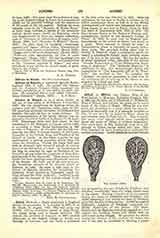

Alfred, or Aelfred, the GREAT, King of the West-Saxons, b. Wantage, Berkshire, England, 849;-d. 899, was the fifth son of Ethelwulf, or Athelwulf, King of Wessex, and Osburh, his queen, of the royal’ house of the Jutes of Wight. When he was four years old, according to a story which has been repeated so frequently that it is generally accepted as true, he was sent by his father to Rome, where he was anointed king by Pope Leo IV. This, however, like many other legends which have crystallized about the name of Alfred, is without foundation. Two years later, in 855, Ethelwulf went on a pilgrimage to Rome, taking Alfred with him. This visit, recorded by Asser. is accepted as authentic by modern historians. In 858 Ethelwulf died and Wessex was governed by his sons, Ethelbald, Ethelbert, and. Ethelred, successively, until 871, when Alfred came. to the throne. Nothing is known of his movements during the reigns of Ethelbald and Ethelbert, but Asser, speaking of him during the reign of Ethelred, gives him the title of Secundarius. In 868 he married Ealhswith, daughter of Ethelred, surnamed the Mickle, Ealdorman of the Gainas. The West-Saxons and the Mercians were then engaged in a war against the invading Danes and Alfred took an active part in the struggle. He ascended the throne during the thickest of this conflict, but before the end of the year he succeeded in effecting a peace probably by paying a sum of money to the invaders. Wessex enjoyed a measure of peace for a few years, but about 875 the Danes renewed their attacks. They were repulsed then, and again in 876 and 877, on each occasion making solemn pledges of peace. In 878 came the great invasion under Guthrum. For a few months the Danes met with success, but about Easter Alfred established himself at Athelney and later marched to Brixton, gathering new forces on the way. In the battle of Ethandim (probably the present Edington, in Wiltshire) he defeated the Danes. Guthrum agreed to a peace and consented to be baptized. It is in connection with this struggle that many of the legends of Alfred have sprung up and been perpetuated the story of the burnt cakes, the account of his visit to the Danish camp in the guise of a harper, and many others. For fifteen years Alfred’s kingdom was at peace, but in 903 the Danes who had been driven out made another onslaught. This war lasted for four years and resulted in the final establishment of Saxon supremacy. These struggles had another result, hardly less important than the freedom from Danish oppression. The successive invasions had crushed out of existence most of the individual kingdoms. Alfred made Wessex a rallying point for all the Saxons and by freeing the country of the invaders unwittingly unified England and prepared the way for the eventual supremacy of his successors.
Popular fancy has been busy with other phases of Alfred’s career than that which is concerned with his military achievements. He is generally credited with establishing trial by jury, the law of “frank-pledge”, and many other institutions which were rather the development of national customs of long standing. He is represented as the founder of Oxford, a claim which recent research has disproved. But even the elimination of the legendary from Alfred’s history does not in any way diminish his greatness, so much is there of actual, recorded achievement to his credit. His own estimate of what he did for the regeneration of England is modest beside the authentic history of his deeds. He endeavored, he tells us, to gather all that seemed good in the old English laws, and adds: “I durst not venture much of mine own to set down, for I knew not what should be approved by those who came after us.” Not only did he codify and promulgate laws, but he looked, too, to their enforcement, and insisted that justice should be dispensed without fear or favor. He devoted his energies to restoring what had been destroyed by the long wars with the invaders. Monasteries were rebuilt and founded, and learned men brought from other lands. He brought Archbishop Plegmund and Bishop Wetfrith from Mercia; Grimbold and John the Old-Saxon from other Teutonic lands; Asser, John Scotus Erigena and many others. He not only encouraged men of learning, but he labored himself and gave proof of his own learning. He translated into Anglo-Saxon: “The Consolation of Philosophy” of Boethius; “The History of the World” of Orosius; the “Ecclesiastical History” of Bede, and the “Pastoral Rule” and the “Dialogues” of St. Gregory the Great. The “Consolation of Philosophy” he not only translated but adapted, adding much of his own. The “Anglo-Saxon Chronicle”, the record of the English race from the earliest time, was inspired by him.
THOMAS GAFFNEY TAAFFE

